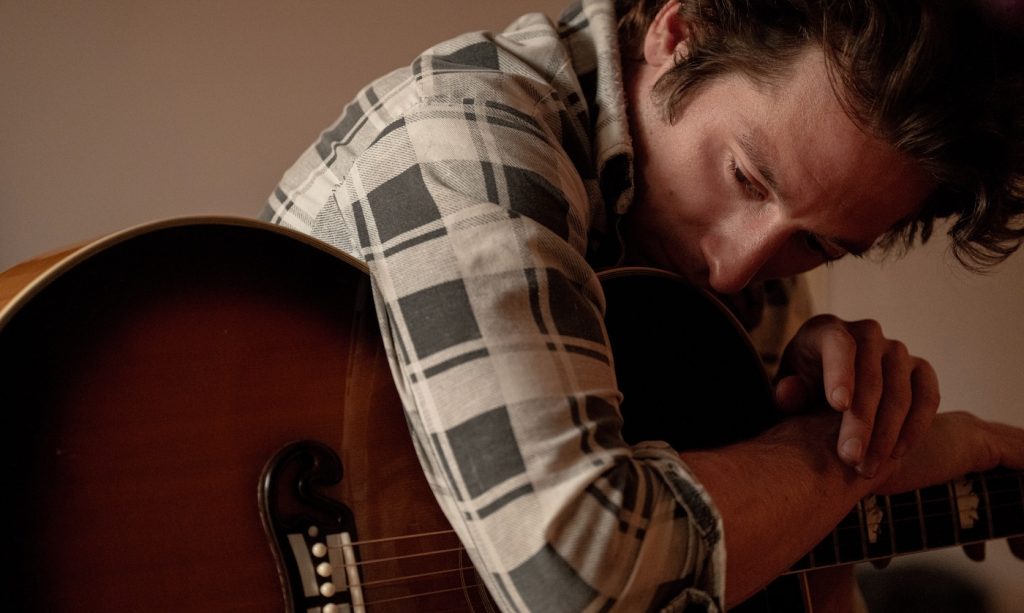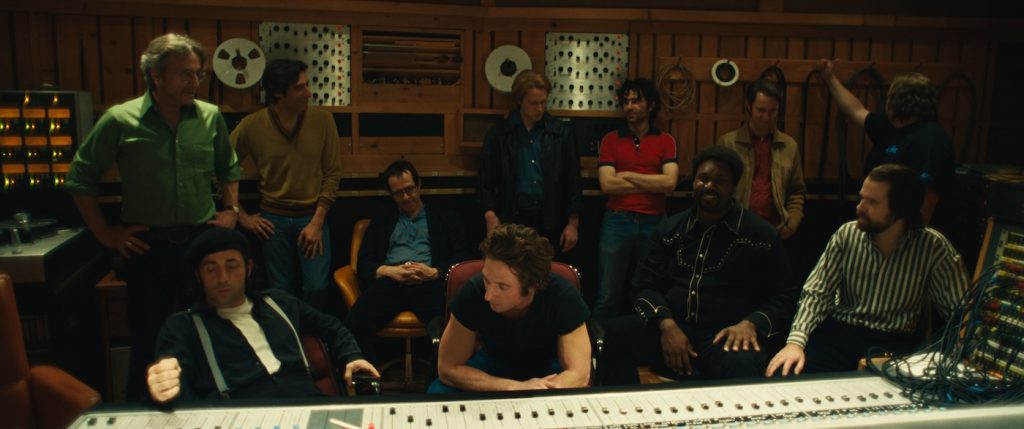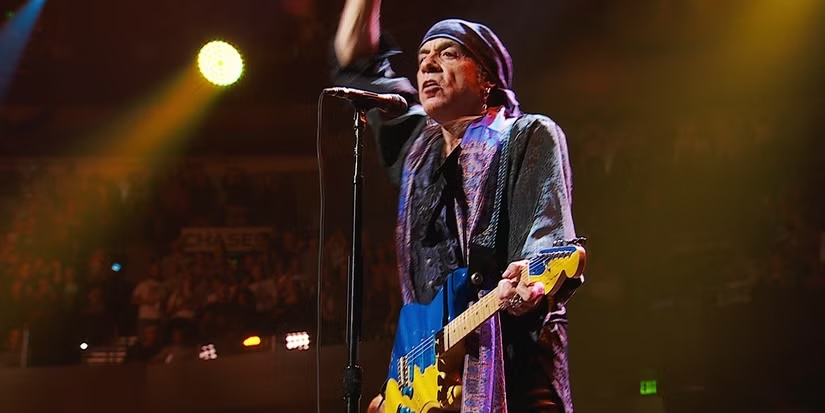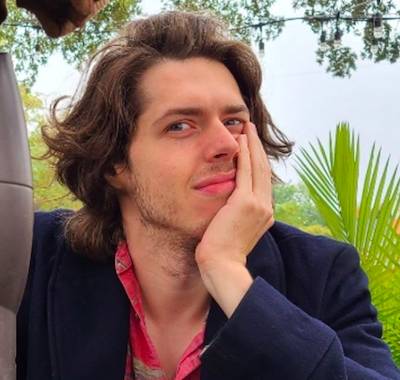Johnny Cannizzaro on Mastering Steven Van Zandt’s Signature Style in “Springsteen: Deliver Me From Nowhere”
Steven Van Zandt of the E Street Band is a singular figure in the world of rock and roll. Nobody else is like him and does what he does, whether jamming with Bruce Springsteen, acting on the screen (his most iconic role was, of course, playing Silvio Dante in The Sopranos), or his solo work. There’s only one Steven Van Zandt, but in Scott Cooper’s Springsteen: Deliver Me From Nowhere, it’s Johnny Cannizzaro who plays the young guitarist before he became a household name.
Scott Cooper’s low-key biopic of the Boss (played by Jeremy Allen White) is about his days recording one of his masterworks, Nebraska, at a time of great torment and confusion. Springsteen suffers a devastating period of depression that makes the creative process more grueling than magical, yet from those dark depths he pulls one of the great albums of the 20th Century. Producer Jon Landau (Jeremy Strong) is there for Bruce, but for the most part, Cooper portrays an isolated Springsteen, lost in his own thoughts and at home.
There’s not a lot of camaraderie or dialogue between Bruce and the E Street Band, but when the film opens during a concert in Cincinnati or shows the band recording Born in the U.S.A., Cannizzaro had to contribute mightily to the film’s authenticity. False notes could sink Cooper’s stripped-down vision of an authentic artist’s descent.
Cannizzaro brings Van Zandt’s signature glee to the picture. The actor, known for Jersey Boys and Mob City, spoke with The Credits about researching, meeting, and becoming Steven Van Zandt.
What did those initial steps involve in playing Steven Van Zandt? What were the first few days of work for you?
As soon as I had booked the role, I immediately wanted to get to work and learn as much about Stevie as I possibly could. I already had a bit of knowledge about him because I grew up in the same area of New Jersey, just about two towns away from one another, in fact, so it just resonated with me even more strongly because of that. I was assigned a guitar coach, who was amazing, and he helped me dissect Stevie — the way that he plays the guitar, his presence on stage, the way he stands, his body movements, and the little motions he does with his head. They may not seem like much to the average viewer, but to me, they were crucial.
With the guitar-playing style, what were the nuances to get down?
Mainly with him, he has a lot of these quirky little head motions. If you watch archival footage of Stevie from concerts back in the eighties, you’ll see what I mean. You can tell how into the music he is, almost like he’s there on stage by himself, but he’s such a big part of the sound of the E Street Band. As he likes to say, he’s the “cover” for Bruce Springsteen, relating to his relationship with Tony Soprano in The Sopranos.
What guitar were you playing with that guitar teacher?
It’s a vintage Strat. It was maybe a ’51 or ’55 Strat, something in that range, but it was vintage. There was a rumor at one point that we were using Stevie’s guitar at the shoot, but that was never confirmed, so I’m not sure if I was using his guitar or not. I know Jeremy was using Bruce’s actual guitar.

Even though we don’t see what Steven Van Zandt is up to in that period of Bruce’s life, did you need to know where his life was at then?
Absolutely. It was just preceding the period of time when Stevie left the band. Lord knows what he had going through his mind at the time, because just like Bruce, he was figuring out who he was as an artist independently as well. Plus, he started to have all these political aspirations, to be more of an activist and get involved with world issues. And then he ventured off to South Africa and had that whole period of his life before coming back to the band. It was all important. That said, the story isn’t about that. At the end of the day, it’s about this period of time in Bruce’s life when he was writing the Nebraska album, and while Stevie was there, the story isn’t about Bruce’s relationship with Stevie or the band.

When you met Mr. Van Zandt, did you have a lot of questions going in, or did you want to chat and see where it went?
I walked in there with a page and a half of questions that I wanted to ask him. I was figuring out how I could do this and still sound smooth about it, because he is such a cool guy. But I wound up not asking a single one of the questions I intended, because he made it so cool and comfortable. The conversation flowed so naturally. I really didn’t have to ask any of my questions. Everything I wanted to know was answered organically through what we were speaking about.
What were some of the questions you had down that you didn’t ask him?
I wanted to know, and it might seem like a silly question, what his relationship with music was. Music is his life. He’s an encyclopedia when it comes to music history. I just didn’t know if he had to — I’m sure he’s been asked that before — but if he had to eloquently express what his relationship with music is, I would’ve liked to hear it in his own words.

How about the way he moved, how he carried himself in that meeting? What stood out?
We were meeting at a little café, and he got there a few minutes before me, but as I was walking up, I could see him through the window. He was kinda setting the table, pulling the table away from the wall to make sure there was enough space. I don’t know if he was doing that intentionally, but he just seemed to be a bit of a quirky guy. I love that because I’ve been told I’m a bit of a quirky mess myself, so I totally understand it. It was just interesting to me that he was meeting someone new and wanted to make sure the area was comfortable and that we could have a compelling conversation. Maybe I’m looking too deeply into that, but it’s something I thought about afterward. It was kind of funny.
When he described what the music means to him, what did that mean to you? How’d it inspire you?
He is probably one of the most passionate people I’ve ever met. He’s such a true artist. For me, it was very relatable, because as a creative — I’m not a rock musician, not a rock star — but I’m an actor, so I relate. I understand the love and the passion. When you’re an artist, you need to express these things. We all go through those periods of time, and that’s what this whole movie is about — expression and Bruce getting out what he needed to get out at the time. To me, it meant a lot. It said to me that I’m not alone on the creative journey I’m on when guys like Stevie Van Zandt and Bruce Springsteen are going through the same struggles as I do, as everyone does. It just makes you feel like you’re doing something right.
Springsteen: Deliver Me From Nowhere is in theaters now.
Featured image: Johnny Cannizzaro. Courtesy Alex Fenyves



